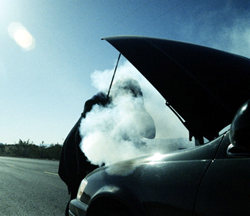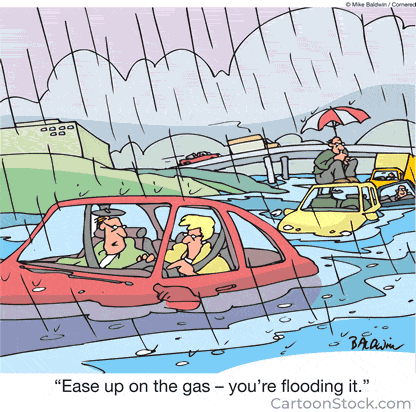
Overheating
Is that steam or smoke coming out from my hood? If it's white, it's steam from your radiator. If white steam is coming out your tailpipe, you probably blew a head gasket. Either way your engine overheated and continuing to drive could seriously damage the engine. Naturally, it's best to keep an eye on your coolant and temperature gauge to prevent this.
If your car begins to overheat, turn your heater on to draw some of the heat out of the engine. Reduce the load on the engine by turning off the air conditioner and shifting into neutral at stops.
If the temperature gauge shows the temperature is too high, pull to the side of the road. Shut it off and let it cool down. Once it is cool you can remove the radiator cap. Do not open the radiator cap when the engine is warm. The radiator is under high pressure and will spray scalding antifreeze on your face and hands if the cap is removed when hot.
Dangers of Overheating
Vehicle overheating can be a serious and potentially dangerous issue for all car and truck owners. Not only can it damage your vehicle's engine, but it can also lead to costly repairs and even cause a vehicle to shut down while driving. Understanding the dangers of overheating and how to recognize and prevent it can help you stay safe and protect your vehicle.
First and foremost, it's important to understand what exactly causes a vehicle to overheat. Generally, overheating can occur when the coolant system fails to properly regulate the temperature of the engine. This can be caused by several factors, including a lack of coolant, a defective thermostat, a radiator or cooling fan malfunction, or a blockage in the cooling system. When the engine temperature rises too high, the vehicle will begin to overheat.
The dangers of vehicle overheating can be serious, and can even lead to complete engine failure. When an engine overheats, the heat can cause a number of components to expand, which can lead to warped cylinder heads, damaged head gaskets, and cracked pistons. This can cause extensive and costly damage, and can even cause a vehicle to shut down while driving. In addition, the heat of an overheated engine can also cause other parts of the vehicle to malfunction, such as the power steering, transmission, and fuel system.
One of the best ways to prevent vehicle overheating is to ensure that your vehicle's cooling system is properly maintained. This includes regularly inspecting the vehicle's cooling system, checking the coolant level, and replacing the coolant every two years or 30,000 miles. It's also important to inspect the cooling fan, thermostat, and radiator hoses for cracks or leaks. Additionally, if your vehicle has a water pump, it should be checked regularly for signs of wear and tear.
You can also help to prevent vehicle overheating by ensuring that the engine is running at the correct temperature. The ideal temperature for an engine is around 195 degrees Fahrenheit, so if the temperature is higher, you may need to adjust the thermostat or check for any other issues.
In the event that your vehicle does overheat, it's important to take the necessary steps to prevent further damage. If your vehicle begins to overheat while driving, it's best to pull over to a safe location and turn off the engine. Additionally, you should check the coolant level, and if necessary, add more coolant or water to the radiator.
Overall, vehicle overheating can be a serious and potentially dangerous issue. Understanding the causes of overheating and taking the necessary steps to prevent it can help you stay safe and protect your vehicle. If you notice any warning signs of overheating, it's important to take action immediately to avoid any further damage.















